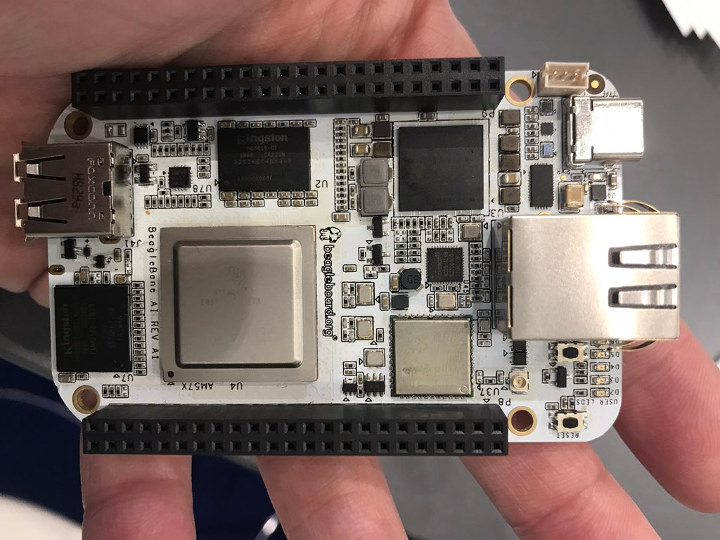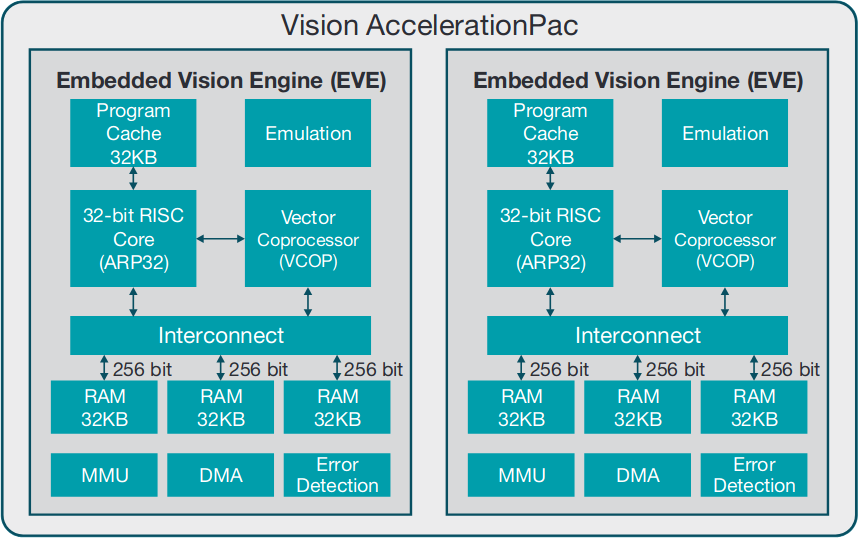Launched in 2013, BeagleBone Black is still one of the most popular hobbyist board thanks to its many I/Os, software support, and affordable price with being the cheapest board around those days. But it looks like we’ll soon have a new version that allows to experiment with artificial intelligence workloads.
BeagleBone-AI is powered by Texas Instruments AM5729 SoC equipped with TI C66x digital-signal-processor (DSP) cores and embedded-vision-engine (EVE) cores supported through a TIDL (Texas Instruments Deep Learning) machine learning OpenCL API.

BeagleBone-AI preliminary specifications:
- SoC – TI AM5729 dual core Cortex-A15 processor featuring 4 PRUs, Dual core C66x DSP, and 4 EVEs
- System Memory – 1GB RAM
- Storage – 16GB on-board eMMC flash with high-speed interface
- Networking – Gigabit Ethernet and high-speed WiFi
- SB – 1x USB type-C for power and superspeed dual-role controller, 1x USB type-A host
- Expansion – BeagleBone Black (BBB) compatible headers
- Dimensions – 86.4 x 53.4 mm (compatible with BBB)
The board will support Linux and offer a “zero-download out-of-box software experience”. There’s currently no product page for TI AM5729 SoC, but TechReport points out that beside the EVE and DSP cores, it is also equipped with a dual core Cortex-A15 processor, a two Arm Cortex M4 real-time cores, a dual-core PowerVR SGX544 3D GPU, and a Vivante GC320 Core 2D accelerator.

The main novelty in the upcoming processor – compared to the existing AM5728 SoC found in BeagleBone-X15 SBC – appears to be the EVE cores that were initially designed for automotive vision applications via a Vision AcclerationPac architecture as shown above, and allegedly offer up to 8 times the performance per watt for computer-vision workloads compared to running them on the Arm Cortex A15 cores. More details about the EVE cores can be found in a document entitled “Empowering automotive vision with TI’s Vision AccelerationPac“. Note that the document is dated “October 2013”, so the EVE core found in AM5729 might be different, but there’s just no public information at this stage.
The product page has currently very limited information, but according to a video interview with Christine Long, Beagleboard Executive Director, at Embedded World 2019, BeagleBone-AI should start shipping to distributors in March or April of this year.
Pricing is still unknown, but for reference BeagleBone Black Rev. C sells for $55, while BeagleBoard-X15 industrial computer goes for $259.99. The price range is wide so those price points do not help that much, but I suspect BeagleBone-AI will likely sell for less than $100 since Beagleboard.org explains “BeagleBone-AI fills the gap between small SBCs and more powerful industrial computers”.
Via Linux Gizmos and Nitin.

Jean-Luc started CNX Software in 2010 as a part-time endeavor, before quitting his job as a software engineering manager, and starting to write daily news, and reviews full time later in 2011.
Support CNX Software! Donate via cryptocurrencies, become a Patron on Patreon, or purchase goods on Amazon or Aliexpress. We also use affiliate links in articles to earn commissions if you make a purchase after clicking on those links.






Does it have jtag connector for direct dsp programming?
It’s probably a re-labeled or very similar to the TDA2SX:
http://www.ti.com/product/TDA2SX
At a glance, I couldn’t find a mention of PRU’s, but everything else seems to match (2xA15, 2xC6x DSP, 4xEVE)
I know the other AM572x SoC’s were based on (or just re-labeled) versions of TI’s automotive SoC’s.
i found this *preview* entry about AM5749 on TI website
http://www.ti.com/product/AM5749
maybe the AM5729 might look a lot like it
it’s right in the title it’s a AM5729…..
I hope the zero download out of the box experience isn’t marketing code for “you’ll never get any of the AI etc blocks working outside of the image we ship on the unit”.
Haha I agree. Seems they are very quiet about IPC to the DSP on their hyped mainline kernel. Reading the alternative SDK kernel docs they hype using default images. I’m not buying anything until I’m convinced